Riskiest foods to eat abroad

There’s no faster way to ruin your dream holiday than with a bout of food poisoning. Whether you have an ultra-sensitive tummy or a stomach of steel, food poisoning does not play favourites. Try to avoid these foods while travelling for a toilet-free trip abroad.
Tap water
Poor water supply is probably the biggest reason for food-borne illnesses in other countries. Every country’s water supply has a unique blend of bacteria and vitamins. If your stomach isn’t used to these, it could cause serious problems. Countries with particularly poor drinking supplies include: Burma (Myanmar), Bolivia, Cambodia, Cameroon, Cape Verde, Chat, Congo, Dominican Republic, Eritrea, Gabon, Ghana, Guyana, Haiti, Honduras, India, Kenya, Kosovo, Liberia, Madagascar, Malawi, Mauritania, Mexico, Namibia, Nicaragua, Niger, Peru, Russia, Senegal, Sierra Leone, Thailand, Turkey, Turkmenistan, Uzbekistan, Venezuela and Zambia.
While it is impossible to avoid water altogether when travelling, it is imperative to locate bottled water from known brands in countries with sub-par water. Check out Smartraveller’s advice for how to consume water where local tap water is not safe. If you are nervous about finding water that is safe to drink in the country you visit, consider stocking up at the airport.
For a detailed look at water safety across Cover-More travel destinations, take a look at our Water Safety playlist:
Leafy greens
If you’re trying to eat healthy while travelling, be wary of leafy greens. Lettuce, spinach, cabbage, kale, arugula, escarole, endive and chard caused a collective 262 outbreaks involving 8,836 reported cases of illness between 1998 and 2008. These veggies are a veritable breeding ground for filth; contaminants can include dirty tap water, manure, or unwashed hands. Salads are best purchased in countries with good drinking supplies and in establishments with good health ratings.
Tuna
This type of fish can be contaminated easily, if not stored at the proper temperature. Often times, foreign street vendors will sell tuna out of stalls in outdoor marketplaces. If tuna is stored above 15 degrees, it can start to go bad. On particularly hot days, avoid that tuna roll to ensure no foodborne illnesses.
Milk
Cultural dairy preferences vary wildly; some like it cold and pasteurized while others keep it on the warm kitchen counter. If you encounter unpasteurized milk (also known as raw milk), look the other way, especially if you do not drink it at home. Raw milk is often consumed in rural communities or places where people consider themselves to be, ironically, more health-conscious. Skipping the pasteurization step means that milk is exposed to Salmonella, Campylobacter, and E. coli.
Pork
Some cultures do not consume pork at all, and with good reason. Pork is a food at high risk for contamination, as undercooked pork can lead to a form of illness called trichinosis. If you are travelling to a part of the country where pork is not typically consumed, stay away from any rogue ham sandwiches that come your way.
The best rule of thumb for eating in another country is to stick to what they know. You wouldn’t travel to America looking for an amazing brekkie of Vegemite on toast, so don’t travel to Mexico looking for mean tuna fish sandwich. Eat heartily and indulge effortlessly when you are covered for food-borne illnesses (and guaranteed to see a good doctor). Consider a policy from Cover-More Travel Insurance and have the confidence you need to expand your culinary horizons.
Image courtesy of Flickr user bluewaikiki; cropped from original
Planning a trip?
Discover Our COVID-19 Cover
To find out what our current* benefits do – and don’t – cover, please read:
Plus, for helpful destination-based COVID-19 information, don't forget to check the COVID-19 Travel Risk Tool before and during travel.
*The cover information contained on the above pages refers to Cover-More policies sold on or after 26 June 2023. For cover information on policies sold prior to this date, please read the relevant PDS.